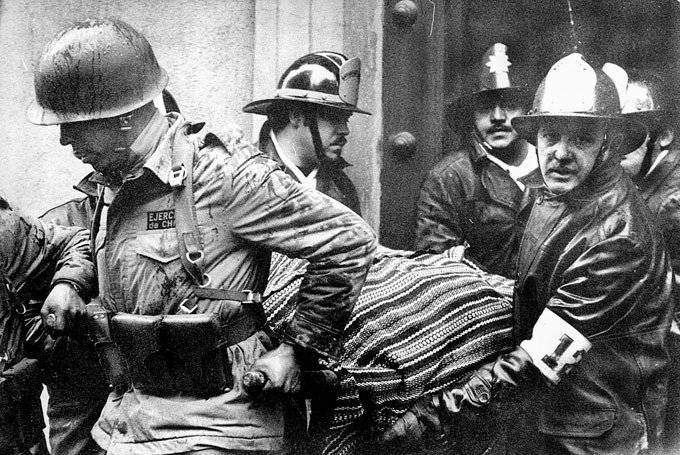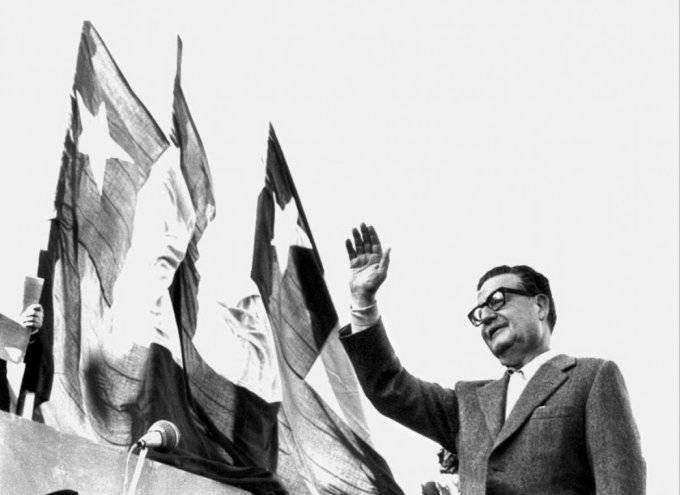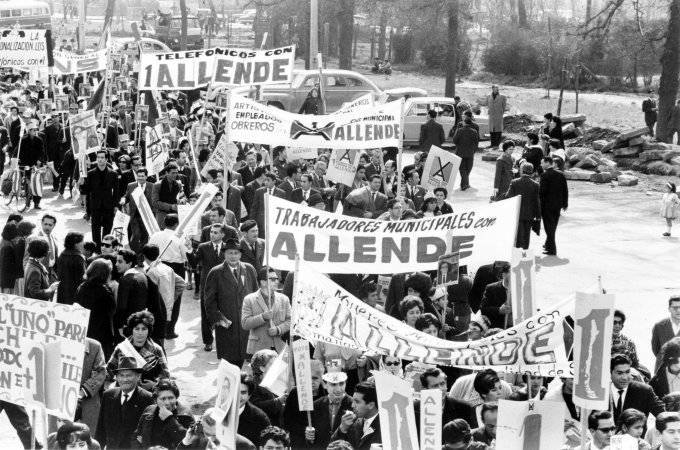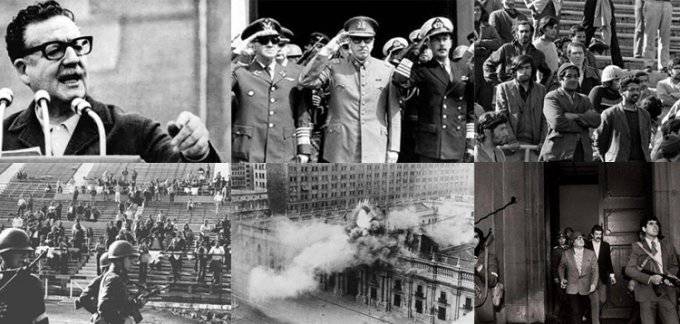Salvador Allende: life and death
Augusto Pinochet Ugarte
Salvador Allende Gossens was born 26 June 1908, in a family of Chilean aristocrats. In 1932, he successfully graduated from the University of Chile in the Faculty of Medicine. For several years he worked as the country's health minister. He created the Socialist Party of Chile, and in 1942 he was appointed Secretary General of the party. In the 52, 58 and 64 years, the People's Action is running for president from the front. In 1969, the front was reorganized into the “People's Unity” alliance, which included socialists, communists, a faction of Christian democrats and members of the Radical Party. With their support in 1970, Allende won the presidential election, promising never to violate the foundations of democracy.
For the years spent by Allende at the helm of the country, there was an outstanding economic growth, accompanied by significant achievements in the social sphere. For 1971 alone, the gross national product rose by 8,5%. The volume of housing construction has increased more than 3 times, unemployment has decreased by half. Over the next two years, the cost of living increased by 330%, the minimum wage and pension by 500%. However, these achievements were partially offset by strong inflation, price increases reached 280%. During the agrarian reform, giant estates of large land magnates were expropriated, which caused their negative response. The herders began to slaughter their cattle or drive their herds to Argentina. Allende also nationalized the largest private companies and banks, in the bulk of which belonged to US monopolies. The new policy envisaged the development of companies under state control. American corporations that invested a lot of money in the industry of this Latin American country, refused to take cash compensation. The United States took unprecedented measures to undermine Chile’s economy, throwing into the world market some of the strategic reserves of molybdenum and copper at low prices, thus depriving Chileans of their main source of export earnings.
Allende announced a temporary moratorium on the payment of foreign debts, which led to the termination of the country's loan and capital outflow. However, the new order of social protection of the population has made life easier for ordinary citizens. Since spring 1973, the expected economic stagnation began in the country, gradually turning into a crisis. In an unstable situation, many residents dreamed of a “firm hand”, while the military, especially young officers, dreamed of material and social privileges. After all, before many officers went on an internship in the Panama Canal area, returning from where they could afford to buy more than one car, and sometimes an entire house. And with the current government, they began to seconded to Cuba.
Outside-sponsored fascists from the Patria and Libertad group blew up oil pipelines, power lines, bridges and railways along the entire coast of Chile, which violated the infrastructure of entire provinces. On some days, up to 50 terrorist acts were committed in Chile. The economy of any prosperous country would not withstand such a sabotage war. But Allende was too democratic to take any harsh measures in the face of a virtually civil war. The mass strikes and demonstrations incited by his opponents led to the fact that in November 1972, in full force, Allende’s cabinet resigned. The President held a lengthy meeting with senior leaders of the country's armed forces, which resulted in the formation on November 72 of the XNUMXnd year of a new government of three military men: General Carlos Prats, Rear Admiral Ismael Huerta and General aviation Claudio Sepulveda.
The Americans could not stand aside, as Allende touched their corporations, the holy shrines of the entire foreign economic policy. In addition, he dangerously became close with the Soviet Union and Cuba. At that time, the United States had not practiced the bombing of countries where objectionable regimes were established, because they did not reach the proper level of democracy and were afraid of the Soviet Union. Therefore, this problem was not the Pentagon, and the CIA. Several dozen experienced intelligence officers worked with the highest army circles of the country. When in the 1973 year, despite the problems in the economy, Allende won the re-election, and sympathy for him and the authority of the people only increased, it became clear that you need to end with him and finish immediately. Here and needed a fallback, a coup d'etat. The operational plan to seize the capital of Santiago was developed six months before the insurgency.
Allende knew something was brewing in the country. He was desperate to find a way out of the situation. This is confirmed by the fact that he repeatedly met with the military, trying to convey to them the true meaning of the reforms taking place in the country. He raised his money allowance, but this was clearly not enough. William Colby, a former director of the CIA, later admitted that from 1970 to 1973, the US government spent more than 8 million dollars on underground CIA shares in Chile. The main obstacle for the coup was General Carlos Prats, who was strongly opposed to the intervention of the army in the affairs of the state and politics. An action was taken to discredit the disobedient general, when one of the wives of the officers publicly gave the brave warrior a slap in the face. The disgraced man was forced to resign. His successor, Pinochet, had a long conversation with Allende, convincing him that he was worthy of his position and would support the government with all his might. A responsible, disciplined, loyal officer, a qualified specialist, actually worked with the CIA with 1972 for the year, and was one of the most active developers of the insurgency plan. In early September, 1973, Nathaniel Davis, the former US ambassador to Chile, went to Washington, where he apparently received the latest directives. A few days later, 11 September 1973, a military coup took place in Chile.
It was a well-planned military action with a combined use of infantry, artillery and aircraft, which allowed the rebels to immediately seize all government and government agencies. The officers who refused to support the uprising were destroyed. Having occupied this or that object, the soldiers shot the socialists, the communists and even the trade union leaders. General arrests and searches took place in the houses. The night on the 11 number Allende spent at his home. When he was informed about the rebellion, he unsuccessfully for a long time on the phone tried to contact Augusto Pinochet and the rest of the commanders, until he understood the obvious. After that, Allende decided to go to La Moneda, the presidential palace. In parting, he told his wife that he would not commit suicide, but he would leave the palace only dead. Apart from Allende, a hundred people, men and women, gathered in La Moneda. Of these, no more than forty were armed, the rest were ordinary civilians. The president loudly announces that he intends to give the uprising the most decisive rebuff, and invites everyone who is afraid to leave. But no one leaves him. After that, the palace begin to prepare for defense.
The President goes on the air, near Magadanes station next to La Maneda, and delivers his last speech, which will then bypass all countries and continents: “Compatriots! This is the last opportunity to contact you. In the face of these events, it remains to say one thing - I will not retire!
...History belongs to us, and it is made by the nations.
... Know that the day is near when a wide path will be opened along which a worthy person will travel to create a better society.
... My death will be a moral lesson and retribution for cowardice, treachery and betrayal. "
Soon, the Magallanes radio station was bombed, and the rebels opened fire on the presidential palace from tanks and armored personnel carriers. At 11 o'clock the assault began. Salvador Allende defended the palace along with everyone. In his hands was a Kalashnikov assault rifle, a gift from Fidel Castro in 1971. The president was persuaded to put on body armor, but for unknown reasons he refused. For more than two and a half hours, forty people fend off rebellious soldiers. Several tanks were shot down. At 12 o'clock the planes begin rocket fire at La Moneda, a fire engulfs the palace. By this time, no more than two dozen defenders of the palace remained alive. At 13:30, tanks break into the courtyard, followed by soldiers. Again, a battle ensues at the front staircase. During the shooting, Salvador Allende dies, the defense of the palace continues. Everything was finished only at 15 o’clock.
There are many versions of how this man died. The most plausible are the stories of the attackers themselves, according to which President Allende was shot dead by an assault rifle of Captain Roberto Garrid. Pinochet later claimed that he never gave the order to kill him. The slain Allende became a martyr and brought the dictator a lot more trouble than he would have had he been sent into exile. The officer fired back and only later realized that he had shot the president. As soon as the counterattack of the defenders of the palace threw the rebels back, the body of Allende was transferred to his office and seated in a chair. They put on his chest a blue presidential ribbon, covering his shoulders with a Chilean flag. After the last defender of the palace fell, the rebels stormed into the presidential office and shot the dead at altitude for loyalty.
According to another version, the president committed suicide at a time when the rebels had already seized the palace. He simply could not be captured in the hands of soldiers, become a hostage to the criminal junta, subjected to humiliation and torture. The next day, Allende was secretly buried in an unmarked grave by order of the new authorities in the cemetery in Viña del Mar. With the return of the democratic government to Chile, the remains of the president were exhumed in 1990 for the reburial of 4 in September of 90 in Santiago. In the spring of 2011, the dust of Allende was again exhumed for research on death. According to the results of a commission of seven Chilean pathologists and five international forensic scientists, Salvador Allende shot himself, firing two bullets from a Kalashnikov machine gun that he held between his legs. The putschists who had seized the palace fired at the dead body, thrusting another thirteen additional bullets. 4 September 2011 the remains of the late President of Chile, Salvador Allende, finally found eternal rest in the family’s cemetery in the family crypt.

A few years ago in Paris, the book “Cuba Nostra: State Secrets of Fidel Castro” was published. It belonged to the famous French journalist, Latin America specialist Alain Ammar. The book is based on the testimony of former security officers of the Island of Freedom - Daniel Alarcón Ramírez and Juan Vives. It is very convincingly told that Salvador Allende was shot by order of Fidel Castro.
The Cuban intelligence service has established a wide agent network in Chile. Not really trusting Allende's valor, Fidel Castro gave the command to Allende’s bodyguard, Patricio de la Guardia, who was also a Cuban security officer, to remove the president if he succumbs to fear. At the very last moment of the assault, when it became clear that Salvador Allende was going to seek asylum from the Swedish Embassy, de la Guardia, he sat him at his desk with the words, “the president will die at his post” shot his head from an automatic rifle.
In the book “The world floated in our hands: the KGB and the struggle for the Third World”, created in the union of the former head of the KGB’s archive department Vasily Mitrokhin, who fled to the West, and the famous historian Christopher Andrew, the facts are that Salvador Allende was a KGB agent, with a code nicknamed "Leader", a lover of women and a reveler. The dossier on Allende testifies that he came under the sights of his organs at the beginning of 50, and regular contacts were established with him in 1961, when the Soviet trade mission appeared in Santiago as a cover for espionage operations. Only thanks to the KGB, he won the election in 1970 year. Soviet intelligence spent more money in Chile than in all other Latin American countries. More than 420 thousand dollars of money alone for all the years of cooperation was transferred to Allende. Soviet intelligence also contacted Ortencia, his wife Allende, and their daughter Beatrice. It is curious that the KGB dossier on El Salvador Allende does not say a word about the involvement of American intelligence agencies in the military coup in the country.
When the military came to power in Chile under the leadership of General Augusto Pinochet, the constitution was immediately abolished, the National Congress was dispersed, all mass and political organizations were declared illegal. According to various sources, there is information that only in the first months after the coup more than 20 thousand people were killed, 35 thousand were in prisons and tortured, about 200 thousand were left without work. The junta eliminated the social and economic transformations of Allende, returned the enterprises and lands to their former owners, and paid monetary compensation to foreign companies. And here the economy of Chile began to fall apart. For the first half of the year, prices for key products have increased several times, the mortality rate has increased. Free medical care was canceled, a third of all children did not go to school due to lack of money, people moved to the slums or emigrated. And this was only the beginning of a recession that lasted until the 1983 year. But the military regime provided exceptional excess profits to North American capital. The Pentagon built a space center in Chile, tracking stations and related infrastructure as part of a strategic defense initiative. Pinochet inherited a foreign debt in the amount of 2200 dollars per capita. The level of development, the former under Allende, the Chilean economy has not reached. It was only in December of 2010 that 13 associates of the Chilean dictator, the elderly from 60 to 90 years, were sentenced to prison in France in absentia.



Information